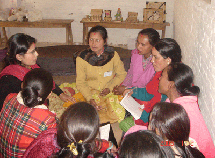 |
|

 Didibahini, from its inception has been facilitating and advocating for women's political empowerment through capacity building trainings and action researches. In 1995 Women in Politics was one of its main strategic agendas. By 1997 DidiBahini accomplished an outstanding task of developing an alternative curriculum for rural women in Nepal which was implemented in 18 different districts
of the country as a pilot research. Later, this was disseminated to other interested institutions and organizations committed to women's empowerment. In 1999 DidiBahini implemented the project Capacity Building Program for Women Leaders (elected and nominated women representatives) at the local level . Gender and Good Governance in Local Government, and Women's Political Empowerment through Development Education are two other projects that DidiBahini implemented to support women's political empowerment.
Didibahini, from its inception has been facilitating and advocating for women's political empowerment through capacity building trainings and action researches. In 1995 Women in Politics was one of its main strategic agendas. By 1997 DidiBahini accomplished an outstanding task of developing an alternative curriculum for rural women in Nepal which was implemented in 18 different districts
of the country as a pilot research. Later, this was disseminated to other interested institutions and organizations committed to women's empowerment. In 1999 DidiBahini implemented the project Capacity Building Program for Women Leaders (elected and nominated women representatives) at the local level . Gender and Good Governance in Local Government, and Women's Political Empowerment through Development Education are two other projects that DidiBahini implemented to support women's political empowerment.
In this regard a survey was conducted in 32 Village Development Committees (VDCs) of Kathmandu, Lalitpur, Parsa and Mohattari districts to get a first hand information and data of women’s existing capacity, identify their needs for enhancing their ability and to prepare women’s profile. This survey revealed the fact that due to the lack of education, information, opportunities for exposure and leadership, women are in a subordinate position.
In order to promote gender equality and to fill in gender gap Women Forums (WFs) were formed in 36 VDCs of Kathmandu, Lalitpur, Bhaktapur and Parsa districts. These forums are apex bodies of different groups (elected and nominated representatives, women from different groups and local CBOs, health workers, social workers etc). These forums provide platform for grassroots' women leaders to familiarize themselves with one another and functions of their respective VDC. It further helps to raise collective voices to exercise their rights and effectively mobilize local resources for the social development of their communities.
Due to the series of capacity building trainings WFs have enabled to interact with government officers at different levels. Women Forums have also developed advocacy and counseling skill, and leadership qualities. They are effectively mobilizing local resources for the benefit of community people. They have established linkage with VDCs, DDCs, government line agencies and number of community based organizations and have access to wide variety of development activities through sectoral agencies. Most of the WFs have identified their needs, developed plan and submitted the proposal to VDCs. Some of the forums have already accomplished the development activities through VDC resources.
The status of these women have been gradually changing from an ordinary housewife to other productive roles. They have been working as a role model in development field to overcome the wide differences between the gender inequalities and to fulfill their role as a political leaders, decision makers and opinion builders.
The skills and knowledge that they have gained are not sufficient enough, therefore they need to learn new skills, acquire knowledge and information to enhance their capacity further. Economical and educational development are interrelated. The education and access to information is considered as huge long term investment for the larger society. Individuals, communities and societies are increasingly confronted with new situations that demand new skills and approaches. The access to information and education enable people to raise awareness to help develop self confidence and stronger personality.
Realizing the necessity, "Didibahini Resource and Learning Center" have been established in four districts. These centers provide the platform for WFs, women, men, youth, children and adult to learn, interact and share information, knowledge, skills and experiences regularly. This help them identify their needs to plan and implement various development projects accordingly.